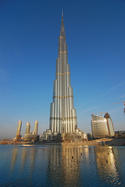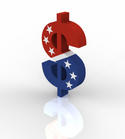Much has been made of California's struggles, but some still say California's best days are ahead of it. In this calculus, innovation in high tech, biotech, green tech, clean tech, any tech will ultimately pull the state out of its current funk and to even greater success tomorrow. Promoters of this view cite an impressive roster of statistics around venture capital, patents, new business formation, etc., along with obligatory anecdotes of ambitious new startups with world changing products (coming soon) and their slick, dynamic founders. read more »
Economics
Move the United Nations to Dubai
The opening last week of the world's tallest building, the half-mile-high Burj Dubai, has largely been greeted with guffaws and groans. The Daily Telegraph labeled it "the new pinnacle of vanity"--"a purposeless monument to the subprime era." The Wall Street Journal compared it to the Tower of Babel. (When the Empire State Building was completed in 1931, in the throes of the greatest financial crisis of the 20th century, it was met with similar jeers. The then-tallest building in the world was called the Empty State Building, and it remained vacant for several years.)
Yet the Burj's completion--indeed the whole wild enterprise known as Dubai--could signal a potential opportunity to the global community: turning the place into the headquarters for that other misguided ship, the United Nations. read more »
China’s Heartland Capital: Chengdu, Sichuan
On May 12, 2008, Chinese architect Stepp Lin was focusing intensely on his professional licensing exam in a testing center in central Chengdu when suddenly he felt someone bumping his desk. By the time he looked up to see what it was, most of the other exam takers were frantically fleeing for the exit. It turns out that what he was feeling were the tremors of what was to be the most devastating earthquake to hit China in recent memory. read more »
Will Anyone Stand Up for American Industry?
“Esau for one morsel of meat sold his birthright. For ye know how that afterward, when he would have inherited the blessing, he was rejected: for he found no place of repentance, though he sought it carefully with tears.” - Hebrews 12:16-17
Built from 1933-1936, the Bay Bridge linking San Francisco to Oakland was an engineering marvel of its day. A complex series of multiple spans, when it opened – six months ahead of the more famous Golden Gate Bridge – it was both the longest suspended bridge deck in the world and the longest cantilever bridge in the world. The western suspension bridge section, technically two bridges in one, had to settle for being only the second and third longest suspension bridges in the world. read more »
Why New York City Needs a New Economic Strategy
When Michael Bloomberg stood on the steps of City Hall last week to be sworn in for a third term as New York City's mayor, he spoke in upbeat terms about the challenges ahead. The situation, however, is far more difficult than he portrays it. American financial power has shifted from New York to Washington, while global clout moves toward Singapore, Hong Kong, and Shanghai. Even if the local economy rebounds, the traditional media industries that employ many of Bloomberg's influential constituents likely will continue to decline. read more »
- Login to post comments
The Football Franchise Hustle: Financing the NFL
The economics of professional football bring more than a few words to mind: scam, hoax, boondoggle, rip-off, racket, con, scheme, fix, subsidy, loophole, ruse, handout, set up, monopoly, and — well, why not — Jimmy Hoffa who, according to urban legend, was interred in the end zone in Giants Stadium.
An insider trading scheme dressed up as a professional sport, pro football finance incorporates everything fishy in the worlds of municipal finance, urban planning, government subsidies, cable television, and, even sometimes, sports. read more »
New Geography Top Stories of 2009
As we bring to a close our first full calendar year at NewGeography.com, we thought readers may be interested in which articles out of more than 350 published enjoyed the widest readership. It’s been a solid year of growth for the site; visits to the site over the past six months have more than tripled over last year and subscribers have increased by a factor of six. The list of popular articles is based both on.readership online and via RSS. read more »
- Login to post comments
How California Went From Top of the Class to the Bottom
California was once the world’s leading economy. People came here even during the depression and in the recession after World War II. In bad times, California’s economy provided a safe haven, hope, more opportunity than anywhere else. In good times, California was spectacular. Its economy was vibrant and growing. Opportunity was abundant. Housing was affordable. The state’s schools, K through Ph.D., were the envy of the world. A family could thrive for generations. read more »
The Crisis Next Time: Public Finance
The financial crisis of 2008 paved the way for the employment crisis of 2009, which has now paved the way for the upcoming public finance crisis of 2010. Most federal, state and municipal budgets are strained to the breaking point while the economy still has not found its footing. Meanwhile our national politics is obsessed with expensive overhauls of environmental policy and healthcare reform. Our latest policy strategy is an attempt to borrow and spend our way to prosperity, ala Japan of the past twenty years. read more »
Don't Give Up On The U.S.
If the U.S. were a stock, it would be trading at historic lows. The budget deficit is out of control, the economy is anemic and the political system is controlled by academic ideologues and Chicago hacks. Opposing them is a force largely comprised of know-nothings--to call them Neanderthals would be too complimentary.
Not surprisingly, many Americans have become pessimistic. Two in three adults now fear their children will be worse off than they are. Nearly 40% think China will become the world's dominant power in the next 20 years, as indicated by a recent survey. read more »






















